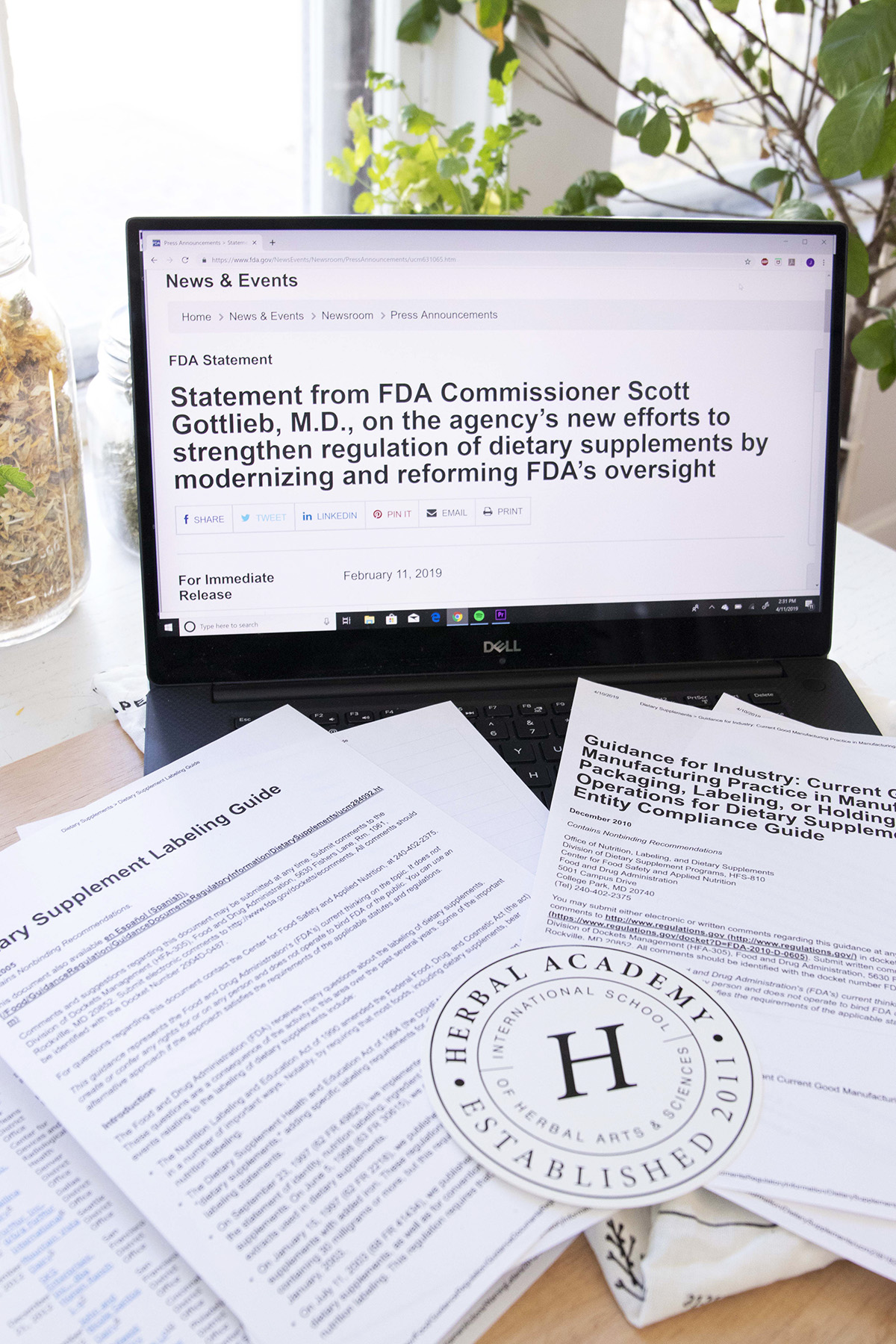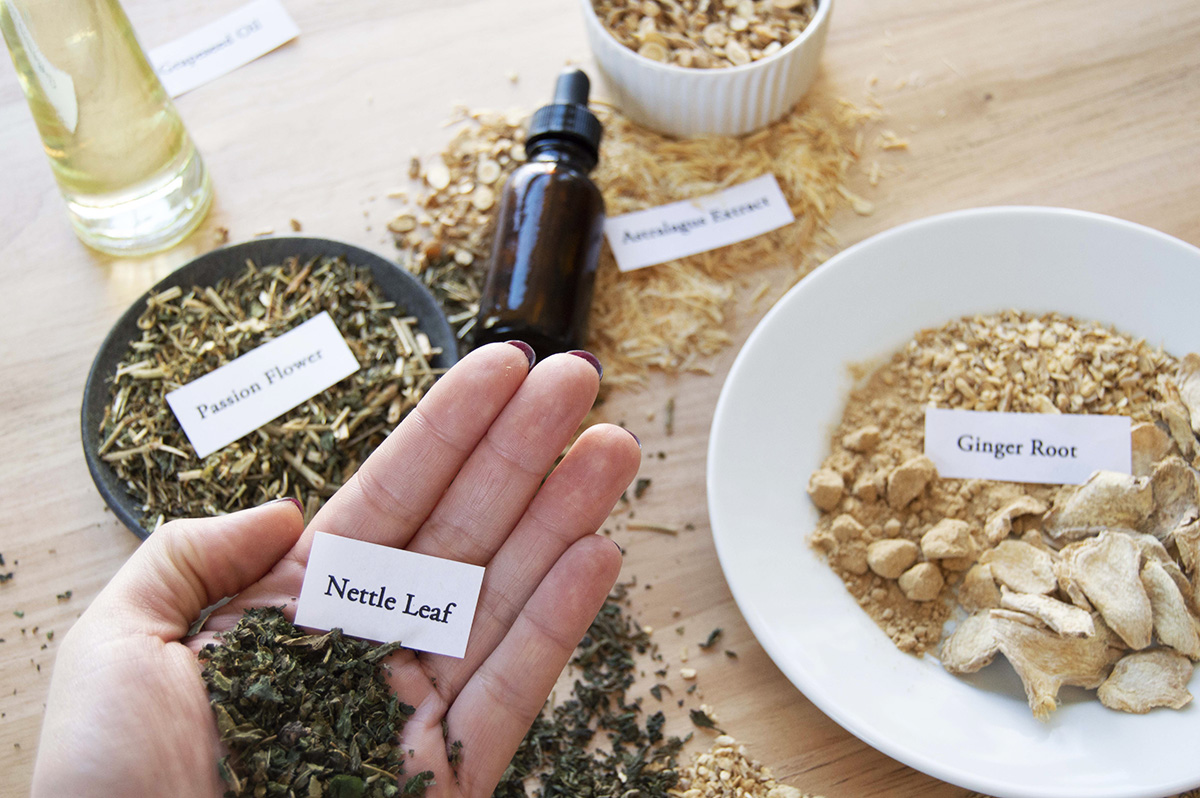
What Could Changes In FDA Dietary Supplement Regulations Mean For Herbalists?
Herbal preparations, which are regulated as dietary supplements by the U.S. Food and Drug Administration (FDA), are popular consumer products for those interested in a holistic approach to wellness. Herbalists, who may use herbs and natural ingredients to make their own holistic preparations for clients and herbal products businesses, must keep informed about FDA dietary supplement regulations surrounding the use and sale of herbs as dietary supplements.
In February, then-FDA Commissioner Scott Gottlieb, M.D., announced the agency’s plans to modernize its regulation and oversight of dietary supplements.
Dr. Gottlieb announced several initiatives to increase FDA oversight (U.S. Food and Drug Administration [FDA], 2019a), including the following, which are of particular interest to herbalists:
- Continued focus on “compliance and enforcement efforts against firms that have shown persistent inability to comply with the current good manufacturing practice requirements for dietary supplements” (FDA, 2019a, para. 20).
- Engagement in a public dialogue to determine whether or not updates are needed to modernize the Dietary Supplement Health and Education Act (DSHEA), the regulations governing dietary supplements, particularly in the area of a mandatory dietary supplement product registration.
In addition, the FDA is currently conducting hearings on compounded medicines in an effort to reevaluate ingredients commonly used in compound medicines created by licensed pharmacies and licensed healthcare practitioners such as doctors and naturopaths.
While some of these initiatives are still being discussed, they could have an impact on herbalists who sell their own herbal products that are regulated as dietary supplements, as well as consumers who opt for natural dietary supplements as part of a healthy lifestyle.
Let’s explore these initiatives to the FDA dietary supplement regulations in more detail.

Dialogue About DSHEA and FDA Dietary Supplement Regulations
The Dietary Supplement and Health Education Act has been in place for 25 years. The law, established in 1994, created a regulatory framework for the safety and labeling of dietary supplements and separated them from drugs and conventional foods. Per DSHEA definition, a dietary supplement is “a product (other than tobacco) that is intended to supplement the diet,” (U.S. Congress/Senate, 1994, Sec. 3(a)(ff)(1)) and preparations such as herbal tinctures, liquid herbal extracts, herbal capsules, and some herbal teas, among others, fall into this category.
Among the FDA’s focus during the past few years has been an increased enforcement action with regard to compliance with regulations governing the manufacture and labeling of dietary supplements. Whereas historically, the FDA’s efforts were focused on big manufacturers, the FDA has been looking with increasing scrutiny at small herbal products businesses, and issuing warning letters to those whom they deem are not in compliance. The issues the FDA often cites include a lack of compliance with current Good Manufacturing Practices (cGMPs) and/or labeling requirements, particularly in terms of the inclusion of what they define as drug claims or structure/function claims on product labels without appropriate pre-approval and/or substantiation. Based on Gottlieb’s announcement, this remains an FDA priority.
Steven Tave, Director of the Office of Dietary Supplements (ODSP) agency within the FDA, suggests that the FDA’s proposed enforcement and policy initiatives have already been underway.
“It’s not the case that it’s going to continue to be business as usual, but I also don’t think that you are going to see a significant change in direction from what we’ve been doing over the past year or two or three. This was really an agency articulation of the direction our program has been moving” (Long, 2019, para. 10).

What this Means for Herbalists
For those herbalists with small herbal products businesses, compliance with these FDA dietary supplement regulations can certainly feel onerous. And, when comparing your hand-grown, lovingly produced, small-batch lemon balm tincture with herbal capsules of powdered substances imported from foreign countries, it might feel like the regulatory priority should remain with those big supplement manufacturers as opposed to conscientious local mom-and-pop herbal shops.
However, the FDA doesn’t make this distinction, and as an herbal product manufacturer, it’s important to educate yourself regarding what is legally required of you. A starting point is your local and state board of health, which can often provide guidance to help you begin your research. Here at the Herbal Academy, both the Entrepreneur and Advanced Herbal Courses include detailed lessons on the FDA’s manufacturing and labeling requirements.
Regarding #2 above, the FDA is presenting the idea of opening the floor for public debate to evaluate the modification of DSHEA in the area of mandatory dietary supplement product registration.
In former Commissioner Gottlieb’s words,
“Industry stakeholders have suggested that the statute should be amended to establish avenues for dietary supplement exclusivity and add a product listing requirement. A mandatory listing requirement could provide significant benefits by improving transparency in the marketplace and promoting risk-based regulation. It could also help facilitate efficient enforcement of the law and establish new mechanisms to identify bad actors who put the public at risk and undermine consumer confidence in the entire industry” (FDA, 2019a, para. 21).
Michael McGuffin, president of the American Herbal Product Association (AHPA), applauded “FDA’s enforcement against products that are falsely labeled as supplements but contain undeclared illegal ingredients and support consistent enforcement of the cGMP rule and the legal prohibitions against disease claims” (Long, 2018, para. 23.) and expressed hope that FDA’s new dietary supplement working group will be considering AHPA’s suggestions for regulatory reform submitted in 2018. In other words, AHPA, in conjunction with and on behalf of responsible dietary supplement manufacturers, will be watching and participating in this process very closely.
Potential Changes to Formulated and Compounded Medicine
The FDA wants to be more aggressive in making it illegal to use some natural substances in compound preparations (Anderson, 2019). This potential legislation would make it illegal to compound or even possess common natural substances if they do not have a federal monograph. The FDA argues that certain compound medicines, such as those that include active pharmaceutical ingredients illegally marketed as dietary supplements, are a risk to patient health and safety, even more so when products claim to be effective in treating serious diseases like Alzheimer’s disease and cancer.

Herbs In Question:
The FDA is currently undergoing hearings to determine the fate of 68 substances, some of the herbs and essential oils commonly used by herbalists, such as astragalus extract, nettle leaf, and tea tree oil.
In addition, 242 additional substances were deemed unworthy of a hearing, placed on a Category 3 list, and will become illegal to compound if this FDA process is enacted as a federal rule (Anderson, 2019). These include alfalfa, anise seed, Chinese rhubarb, dandelion (Taraxacum officinale), grapeseed oil, ginger root powder, Ginkgo biloba extract, cedarwood essential oil, Jamaican dogwood (Piscidia erythrina), mullein, myrrh tincture, parsley, passionflower extract, peppermint oil, pine tar, pipsissewa, psyllium, sage oil, saw palmetto, and uva ursi extract (FDA, 2019b).
The FDA’s complete list can be found here.
What is Compounding?
Per the FDA, “Compounding is generally a practice in which a licensed pharmacist, a licensed physician, or, in the case of an outsourcing facility, a person under the supervision of a licensed pharmacist, combines, mixes, or alters ingredients of a drug to create a medication tailored to the needs of an individual patient” (FDA, 2018).
This potential legislation would only affect those who procure compounded “medicines” from pharmacies, the pharmacies that do the compounding, and those who are licensed to prescribe them. Physicians, integrative medicine practitioners, or naturopaths who mix up tinctures or other preparations in their offices may be considered compounders so this legislation, if enacted, could affect them.

Since MOST herbalists are not licensed pharmacists, physicians, or working under the supervision of a licensed pharmacist, and since herbalists do not work with “drugs” nor create “medications” (nor do we have “patients”), it appears that this legislation would not apply to most herbalists (unless they are also a licensed physician).
Naturopathic Doctor (N.D.) Paul Anderson supports the availability of these medicines and has been testifying at these hearings as a subject matter expert. In an interview with the Journal of Restorative Medicine, Dr. Anderson said, “If you use natural medicines that your ND or integrative medicine MD gets from compounding pharmacies, these medicines will likely be a lot less available next year” (2019, para. 22). However, it is important to note that “a supplement company would still be allowed to make substances on the category 3 list because supplement companies fall under a different part of the FDA jurisdiction” (Anderson, 2019, para 20).

The Future of Herbalism
The FDA’s goals to protect and ensure the safety of consumers who use dietary supplements must also take into account the original goal of DSHEA, providing a common-sense approach to regulation of dietary supplements as opposed to lumping them in with the more stringent regulations applicable to drug products.
These potential changes to FDA dietary supplement regulations are an invitation to all herbalists—clinical and entrepreneur, growers, producers, as well as family and community herbalists—to inform yourselves and be a part of the conversation that could determine the accessibility of holistic, natural ingredients and dietary supplements.
What Can Herbalists Do to Get Involved?
- Educate yourself. Familiarize yourself with the Dietary Supplement and Health Education Act and FDA Guidance Documents (see Resources section below) so you understand what the legislation dictates for you as an herbalist and herbal products manufacturer.
- Work together. Speak to other herbalists in and outside of your community about how these initiatives have affected or will affect their business. Stay tuned to AHPA, which advocates on behalf of the natural products industry.
Here at the Herbal Academy, we feel a responsibility to bring this information on potential FDA dietary supplement regulations to our community’s attention, and we will keep our courses updated with the latest information should legal changes be made.
Both the Entrepreneur and Clinical Herbalist Path Packages have been designed to provide powerful tools and training to help aspiring herbalists on their professional journey. With registration into these online herbal programs, students also get exclusive access to the Herbal Academy’s student-only community to continue these discussions with our student body and staff teaching team.
Learn more about our course offerings by visiting our Courses Webpage. To stay updated on the latest herbal industry news, sign up for our newsletter.
Resources for Herbalist Business Owners:
American Herbal Products Association http://www.ahpa.org
Dietary Supplement Health and Education Act (DSHEA). Public Law 103-417. 103 rd Congress. Stat 4325(codified at 21 USC 301).
Guidance for Industry: A Dietary Supplement Labeling Guide, U.S. Food and Drug Administration
Guidance for Industry: Current Good Manufacturing Practice in Manufacturing, Packaging, Labeling, or Holding Operations for Dietary Supplements; Small Entity Compliance Guide, U.S. Food and Drug Administration
List of Bulk Drug Substances That Can Be Used to Compound Drug Products in Accordance with Section 503A of the Federal Food, Drug, and Cosmetic Act https://www.federalregister.gov/documents/2019/02/19/2019-02367/list-of-bulk-drug-substances-that-can-be-used-to-compound-drug-products-in-accordance-with-section
The FDA and the Fate of Compounded Medicines: https://restorativemedicine.org/journal/fda-fate-compounded-medicines/?fbclid=IwAR2EyrjMAvEA0qH68sckaq4EAWncbt0HGxSj0lxtARXmwzyOjExV8Ao1ZkU
REFERENCES
Anderson, P. (2019). The FDA and the Fate of Compounded Medicines. Journal of Restorative Medicine, 8(1), 1-5. Retrieved from https://restorativemedicine.org/journal/fda-fate-compounded-medicines/?fbclid=IwAR2EyrjMAvEA0qH68sckaq4EAWncbt0HGxSj0lxtARXmwzyOjExV8Ao1ZkU
Long, J. (2018). FDA Commissioner announces formation of dietary supplement working group. Retrieved from https://www.naturalproductsinsider.com/regulatory/fda-commissioner-announces-formation-dietary-supplement-working-group
Long, J. (2019). FDA official: Gottlieb announcement shows dietary supplements is ‘agency priority. Retrieved from https://www.naturalproductsinsider.com/regulatory/fda-official-gottlieb-announcement-shows-dietary-supplements-agency-priority
U.S. Congress/Senate. (1994). Dietary Supplement Health and Education Act, Public Law 103-417, 103- rd. Congress. Stat 4325(codified at 21 USC 301). Retrieved from http://www.gpo.gov/fdsys/pkg/STATUTE-108/pdf/STATUTE-108-Pg4325.pdf
U.S. Food and Drug Administration. (2019a). Statement from FDA commissioner Scott Gottlieb, M.D., on the agency’s new efforts to strengthen regulation of dietary supplements by modernizing and reforming FDA’s oversight. Retrieved from https://www.fda.gov/NewsEvents/Newsroom/PressAnnouncements/ucm631065.htm.
U.S. Food and Drug Administration. (2019b). Bulk drug substances nominated for use in compounding under section 503A of the federal food, drug, and cosmetic act. Retrieved from https://www.fda.gov/media/94155/download
U.S. Food and Drug Administration. (2018). Human drug compounding. Retrieved from https://www.fda.gov/drugs/guidancecomplianceregulatoryinformation/pharmacycompounding/default.htm







